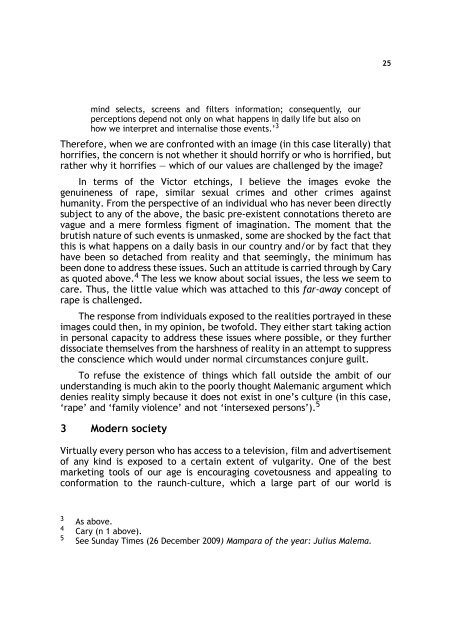Download this publication - PULP - University of Pretoria
Download this publication - PULP - University of Pretoria
Download this publication - PULP - University of Pretoria
You also want an ePaper? Increase the reach of your titles
YUMPU automatically turns print PDFs into web optimized ePapers that Google loves.
mind selects, screens and filters information; consequently, our<br />
perceptions depend not only on what happens in daily life but also on<br />
how we interpret and internalise those events.’ 3<br />
Therefore, when we are confronted with an image (in <strong>this</strong> case literally) that<br />
horrifies, the concern is not whether it should horrify or who is horrified, but<br />
rather why it horrifies — which <strong>of</strong> our values are challenged by the image?<br />
In terms <strong>of</strong> the Victor etchings, I believe the images evoke the<br />
genuineness <strong>of</strong> rape, similar sexual crimes and other crimes against<br />
humanity. From the perspective <strong>of</strong> an individual who has never been directly<br />
subject to any <strong>of</strong> the above, the basic pre-existent connotations thereto are<br />
vague and a mere formless figment <strong>of</strong> imagination. The moment that the<br />
brutish nature <strong>of</strong> such events is unmasked, some are shocked by the fact that<br />
<strong>this</strong> is what happens on a daily basis in our country and/or by fact that they<br />
have been so detached from reality and that seemingly, the minimum has<br />
been done to address these issues. Such an attitude is carried through by Cary<br />
as quoted above. 4 The less we know about social issues, the less we seem to<br />
care. Thus, the little value which was attached to <strong>this</strong> far-away concept <strong>of</strong><br />
rape is challenged.<br />
The response from individuals exposed to the realities portrayed in these<br />
images could then, in my opinion, be tw<strong>of</strong>old. They either start taking action<br />
in personal capacity to address these issues where possible, or they further<br />
dissociate themselves from the harshness <strong>of</strong> reality in an attempt to suppress<br />
the conscience which would under normal circumstances conjure guilt.<br />
To refuse the existence <strong>of</strong> things which fall outside the ambit <strong>of</strong> our<br />
understanding is much akin to the poorly thought Malemanic argument which<br />
denies reality simply because it does not exist in one’s culture (in <strong>this</strong> case,<br />
‘rape’ and ‘family violence’ and not ‘intersexed persons’). 5<br />
3 Modern society<br />
Virtually every person who has access to a television, film and advertisement<br />
<strong>of</strong> any kind is exposed to a certain extent <strong>of</strong> vulgarity. One <strong>of</strong> the best<br />
marketing tools <strong>of</strong> our age is encouraging covetousness and appealing to<br />
conformation to the raunch-culture, which a large part <strong>of</strong> our world is<br />
3 As above.<br />
4 Cary (n 1 above).<br />
5 See Sunday Times (26 December 2009) Mampara <strong>of</strong> the year: Julius Malema.<br />
25

















